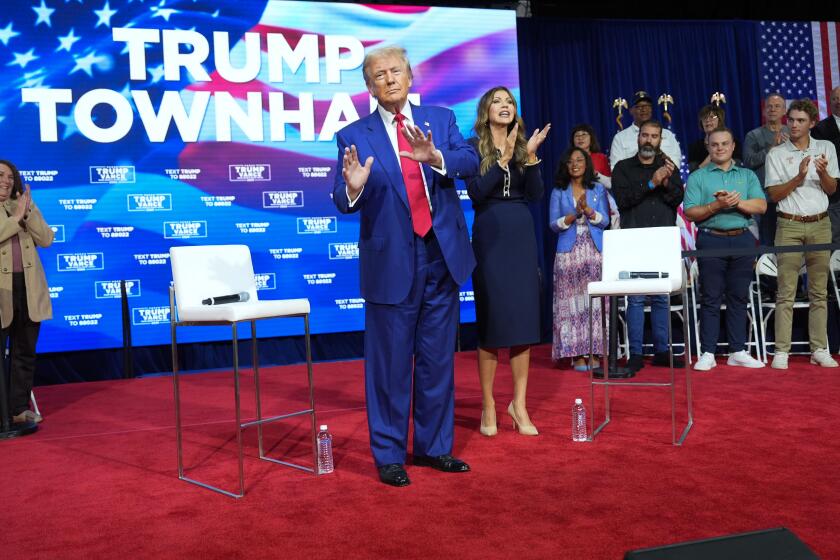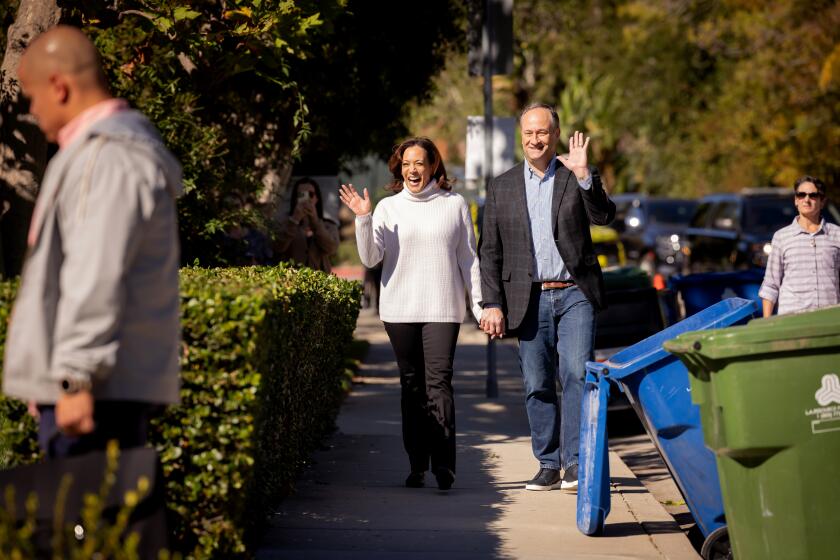Soviets Alter Summit Plans; Session Dropped
While President Reagan rested from his transatlantic flight, unexpected difficulties surfaced Thursday in what White House officials thought were previously settled arrangements for the five-day Moscow summit.
White House aides said one of the five meetings scheduled between Reagan and Soviet leader Mikhail S. Gorbachev had been canceled at the request of Soviet officials, although other sessions were expanded so the two leaders will spend a total of about six hours together, as had been planned.
It is not clear whether the last-minute cancellation reflected internal problems on the Soviet side or some more routine difficulty. But some U.S. officials acknowledged that the change in the carefully negotiated schedule of meetings between the two leaders was unexpected and puzzling.
Session With Advisers
Reagan conferred briefly late in the day with senior advisers, reviewing details of the summit schedule, “including the mutual decision” to scrub the meeting next Monday with Gorbachev, officials said.
“This reflects an official schedule that is similar to the Washington summit in terms of both total times and number of meetings,” the White House said. “The remainder of the President and Mrs. Reagan’s schedule is unchanged.”
White House spokesman Marlin Fitzwater said the shift in the long-planned schedule was sought to accommodate “an internal meeting Gorbachev had to go to.”
He said the Soviets requested the change “some days ago,” and he added, “I regard this as routine.”
But he offered no explanation of what might have come up in the Kremlin sufficiently compelling to force a change in the summit schedule.
And although the White House portrayed the elimination of the session as one that kept the Moscow schedule on a track parallel to that of Gorbachev’s visit to Washington in December, the Soviet request to drop the meeting prompted U.S. Ambassador Jack F. Matlock Jr. in Moscow to seek an explanation from the Kremlin.
Another Administration official said Matlock was told that “it’s not being reasonable to have such a meeting in the tight schedule.”
Complaining about the uncertain explanation behind the cancellation, the U.S. official, speaking on the condition of anonymity, said, “I don’t think they’ve really given us one that anyone really understands.”
In addition to the problem with the Monday afternoon Reagan-Gorbachev session, problems arose over arrangements for two events on Reagan’s agenda intended to draw attention to human rights issues.
U.S. officials said the Soviets were raising objections about who would attend Reagan’s planned visit with religious leaders at the historic Danilov Monastery at midday Monday. In particular, they objected to the planned presence of several relatively independent members of the Russian Orthodox clergy, the sources said.
Dissidents Invited
The nature of the monastery meeting is considered important by the White House because it was to provide the President with an opportunity to encourage greater religious freedom in the Soviet Union.
In addition, according to an Administration official and others in Helsinki, the Soviets sought to block several dissidents from traveling to Moscow after some had been invited by the White House to a meeting with Reagan next Monday.
And two reporters from Radio Free Europe/Radio Liberty were being prevented by Soviet officials from covering the summit. One, stationed in Munich, West Germany, was allowed to enter Moscow but was given no press credentials, and the other, based in Washington, was told that his visa to enter the Soviet Union was being withdrawn, the radio network said.
A Soviet official said Thursday in Moscow that Reagan’s planned meeting with political dissidents and Jews who have been refused permission to emigrate will not help improve Soviet-American relations.
‘Free to Decide’
Vladimir F. Petrovsky, a deputy foreign minister, expressed regret at the President’s plans but said it is for Reagan to decide what Soviet citizens he will meet.
“The U.S. President, who will be our guest in Moscow, is certainly free to decide which Soviet citizens he finds interesting and useful to meet with outside the framework of official events,” Petrovsky said.
While Soviet officials appreciate Reagan’s desire to meet with broad circles of the Soviet public, as Gorbachev did in Washington in December, they see the meeting with dissidents and refuseniks “in a different light, since the point at issue is an obviously tendentious selection of the participants.”
“One thing is already clear,” Petrovsky said. “This American move is hardly aimed at improving mutual understanding between the United States and the Soviet Union.”
While White House officials labored in Helsinki and Moscow to clear the last-minute hurdles before Reagan’s scheduled arrival Sunday in Moscow, the President and First Lady slept late--past noon, Fitzwater indicated.
Stone-Skipping Pause
Later, the Reagans strolled together in a park-like area along an inlet of the Gulf of Finland.
The President, dressed in a sports jacket and plaid trousers, and Mrs. Reagan, wearing a sweater and slacks, chatted with two young girls walking a dog on the sunny but cool afternoon. A White House announcement said the President paused in the 30-minute walk to skip stones across the surface of the chilly water.
The stop in Finland was scheduled to allow the Reagans to adjust to the seven-hour time difference before arriving in Moscow.
As of Thursday evening, the controversial guest list for the visit to the Danilov Monastery remained unsettled, leaving up in the air the prospects for one of the central elements in Reagan’s agenda beyond the meetings with Gorbachev.
The monastery was founded in 1282 by Prince Danil Aleksandrovich, disbanded soon after the 1917 Russian Revolution and turned, at various times, into an office building, warehouse and prison. It was returned to the Russian Orthodox Church in 1983, after which it was restored.
Reluctant Patriarch
“It seems as if there is a reluctance--darn near a refusal--on the part of the patriarch of the church to accept our list for the meeting,” the Administration official said.
Patriarch Pimen is considered to be closely aligned with the KGB, the Soviet secret police, and the Administration official said, “He’s been co-opted by the state.”
“The best assessment is there are people on that (guest) list who are younger priests who have made it known it is long past time for the patriarch to retire,” the official said, adding that “there are certain people we want there.”
Chief among them is a younger priest, identified only as Father Zenon, who has been involved in the restoration of icons, a primary activity at the monastery. “But he is also part of what a layman might call the progressive group in the church,” the official said.
At one point, the official said, the White House was informed that “no, you won’t have the meeting here.”
With the matter unresolved, White House officials in Moscow considered searching for another location for Reagan to meet with Soviet religious figures in order to have more control of the list of those taking part.
‘A Credible Event’
The issue has become particularly sensitive because Reagan has spoken recently--upon his departure Wednesday from the White House, for example--about Soviet steps to relax opposition to the practice of religion.
“We want to keep this a credible event,” the official said. “We don’t want to go to a meeting with a bunch of people they planted.”
At the same time, White House officials were optimistic that they had overcome a potential problem with Reagan’s plan to meet Monday afternoon with Soviet dissidents and refuseniks at Spaso House, the official residence of the U.S. ambassador in Moscow.
Officials reported that three dissidents, including two in Leningrad and another at an undisclosed location, had originally been blocked from taking part in the session.
“They were informed--we have to assume by the KGB--that they would not be allowed to travel outside their towns while the President was in Moscow,” the official said.
One of the dissidents was identified as Elena Keis-Kuna, who was detained for three hours Tuesday after trying to board a Moscow-bound train, according to her sister, Anna Rosnovsky, who spoke with reporters in Helsinki on Thursday.
The Administration official said that Ambassador Matlock raised a “strong complaint” with the Soviets and that the matter appeared to have been resolved, although reports relayed by the dissidents to their supporters in Helsinki left this in doubt.
Times staff writer Michael Parks contributed to this story from Moscow.
Related stories in View and Calendar.
More to Read
Get the L.A. Times Politics newsletter
Deeply reported insights into legislation, politics and policy from Sacramento, Washington and beyond. In your inbox three times per week.
You may occasionally receive promotional content from the Los Angeles Times.










